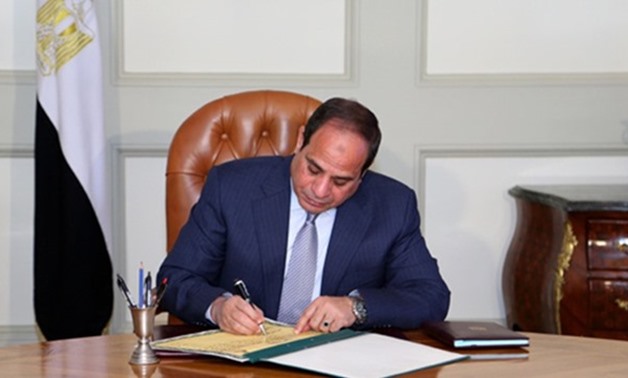
President Abdel Fatah al-Sisi - File photo
CAIRO - 2 June 2018: During his first presidential term, President Sisi signed some controversial bills into laws, some of which have really invited major controversy.
On Saturday, President Sisi was sworn-in as the president of Egypt for a second consecutive term.
In the March presidential vote, Sisi garnered 97.08 percent of valid votes in the presidential election, where more than 21.8 million people voted for him. His rival, Chairman of Al-Ghad political party, Moussa Mustafa Moussa, received 656,534 votes, making up 2.9 percent of the valid ballots.
Here are the most controversial laws passed by Parliament during Sisi’s first tenure:
Terrorism-related laws
As part of Egypt’s efforts to fight terrorism, President Abdel Fatah al-Sisi issued a new law in 2015 that gives a broad definition of terrorist entities, and the sentences against them.
The law defines a terrorist entity as a group or an individual that "through any means inside or outside the country, seek to call for the disabling of laws, or to prevent state institutions or public authorities from functioning, or seek to attack the personal liberty of citizens or other freedoms and rights granted to citizens by the law and constitution, or to harm the national unity and social peace."
It also includes those who commit attacks either inside or outside Egypt. According to the law on terrorist entities (Law No. 8/2015), the general prosecution shall create a proscribed terrorist list which is then to be referred to the Egyptian court, which will have the final say as to individuals’/groups’ designation as terrorists.
NGO law
In May 2017, Sisi ratified a law regulating the work of civil society organizations in the country. The law sees the creation of a new body called the National Authority to Regulate NGOs Operations.
The new NGO Law states that the government authority has to complete the documentation procedure with the new association within a maximum period of 16 days and also mandates that the government must first approve any kind of foreign funding that shall be presented to any Egyptian NGO.
It also allows foreign communities living in Egypt to establish their own bond or association as a foreign NGO, to defend the community’s interests and offer not-for-profit services to the members of the community.
Unlicensed churches
In April 2018, the Cabinet approved legislation proposed by its committee for legalizing unlicensed churches and service buildings on Wednesday. The legislation is set to legalize 166 churches and buildings across the nation.
The committee was formed by the Cabinet and was assigned to rectify the status of churches that are not yet licensed in accordance with the 2016 law regulating the construction and renovation of churches.
Then-acting prime minister and current Housing Minister Mostafa Madbouly issued a decision to provide all possible means to speed up the procedures for legalizing unlicensed churches nationwide.
Formed in January 2017, the committee was empowered to study and verify applications submitted by Christian congregations to legalize the status of churches and attached places of worship.
Tiran Sanafir
On June 14, 2017, Parliament approved en masse the transfer pact in a general session and referred it to President Abdel Fatah al-Sisi for ratification. Ten days later, Sisi approved the said agreement, insisting that the matter is forever closed.
Last March, the Supreme Constitutional Court officially turned down the curtains on the Red Sea Islands Transfer Pact between Egypt and Saudi Arabia, per which Cairo announced Saudi sovereignty on the disputed islands.
In April 2016, both countries signed a maritime border demarcation accord, per which Egypt announced Saudi Arabian sovereignty over the strategic islands, located on the entrance of the Aqaba Gulf in the Red Sea. Public outcry was sparked by hundreds of Egyptians, prompting some lawyers to take legal actions against its implementation.
During Saudi King Salman bin Abdel Aziz's 2016 visit to Egypt, several political and economic agreements were signed, the most important of which ceded Egyptian sovereignty over the strategic islands to Saudi Arabia. Nationwide demonstrations later ensued.
Additional reporting by: Nawal Sayed, Rehab Ismail and Marina Gamil

Comments
Leave a Comment